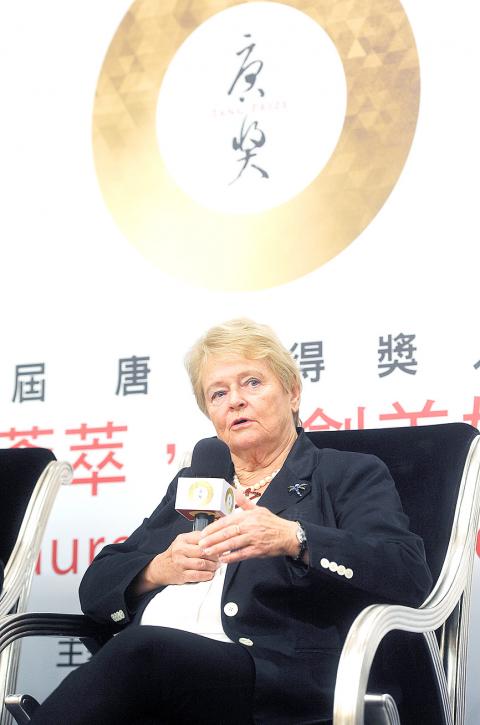Former Norwegian prime minister Gro Harlem Brundtland, the winner of the first Tang Prize in Sustainable Development, on Friday said that nuclear power is not her preferred source of new energy due to the complexities involved.
Brundtland, who chaired the World Commission on Environment and Development (WCED) from 1984 to 1987, said the assessment and analysis of nuclear energy was one of the most difficult issues to agree on among the members of the commission.
“In the end, having analyzed and described the risks and potential of nuclear energy, we agreed on a conclusion that nuclear energy in the future is only sustainable and acceptable if the still-unsolved problems with regard to storage of the waste have been solved,” she said at a press conference in Taipei in response to questions on her views about Taiwan’s nuclear controversy.

Photo: Fang Pin-chao, Taipei Times
Brundtland said that nuclear power needs to be made safer because it still accounts for about 20 percent of the energy use in the world.
It means that any government responsible for nuclear energy, or planning to adopt nuclear energy, has to take that responsibility seriously, she said.
Given that countries cannot immediately stop using nuclear power, they are advised to move toward solar energy, renewable energy and other solutions while gradually reducing the use of fossil fuels, Brundtland said.
She said that although nuclear power could become safer in the future, it is not her “preferred new energy source” because she thinks it entails too many complexities.
The question was raised at the press conference in view of an ongoing controversy about the construction of the Fourth Nuclear Power Plant in New Taipei City’s Gongliao District (貢寮) amid public concerns over safety.
The Fourth Nuclear Power Plant project began in 1999 and is near completion, but the fuel rods have not yet been installed due to widespread opposition to nuclear power. The plant is located in New Taipei City, Taiwan’s most populous municipality.
Meanwhile, when speaking at a forum at Greater Kaohsiung’s National Sun Yat-sen University on Wednesday as part of a week of lectures and other activities in celebration of the first Tang Prize, she said the world is facing the challenge of transforming itself into a green economy.
However, she said there was a problem with tax systems, saying that the richest should be more heavily taxed and that subsidies for chemical fuels should be scrapped.
She said Taiwan has a big problem of low taxation and urged the implementation of a more reasonable tax system.
Brundtland, the “godmother of sustainable development,” was awarded the first Tang Prize in Sustainable Development on Thursday for her work in the sector.
The 1987 “Brundtland Report” by the WCED laid the groundwork for the 1992 Earth Summit in Rio de Janeiro, Brazil, which produced a global action plan for sustainable development known as Agenda 21 and initiated the UN Framework Convention on Climate Change, the lead-up to the 1997 Kyoto Protocol.
The report defined the term “sustainable development” as “development that meets the needs of the present without compromising the ability of future generations to meet their own needs.”
The concept supports economic and social development, while highlighting the importance of protecting the environment and natural resources.

ANOTHER EMERGES: The CWA yesterday said this year’s fourth storm of the typhoon season had formed in the South China Sea, but was not expected to affect Taiwan Tropical Storm Gaemi has intensified slightly as it heads toward Taiwan, where it is expected to affect the country in the coming days, the Central Weather Administration (CWA) said yesterday. As of 8am yesterday, the 120km-radius storm was 800km southeast of Oluanpi (鵝鑾鼻), Taiwan’s southernmost tip, moving at 9kph northwest, the agency said. A sea warning for Gaemi could be issued tonight at the earliest, it said, adding that the storm is projected to be closest to Taiwan on Wednesday or Thursday. Gaemi’s potential effect on Taiwan remains unclear, as that would depend on its direction, radius and intensity, forecasters said. Former Weather Forecast

As COVID-19 cases in Japan have been increasing for 10 consecutive weeks, people should get vaccinated before visiting the nation, the Centers for Disease Control (CDC) said. The centers reported 773 hospitalizations and 124 deaths related to COVID-19 in Taiwan last week. CDC Epidemic Intelligence Center Director Guo Hung-wei (郭宏偉) on Tuesday said the number of weekly COVID-19 cases reported in Japan has been increasing since mid-May and surpassed 55,000 cases from July 8 to July 14. The average number of COVID-19 patients at Japan’s healthcare facilities that week was also 1.39 times that of the week before and KP.3 is the dominant

The Chinese Communist Party’s (CCP) working group for Taiwan-related policies is likely to be upgraded to a committee-level body, a report commissioned by the Mainland Affairs Council (MAC) said. As Chinese President Xi Jinping (習近平) is increasingly likely to upgrade the CCP’s Central Leading Group for Taiwan Affairs, Taiwanese authorities should prepare by researching Xi and the CCP, the report said. At the third plenary session of the 20th Central Committee of the CCP, which ended on Thursday last week, the party set a target of 2029 for the completion of some tasks, meaning that Xi is likely preparing to

US-CHINA TRADE DISPUTE: Despite Beijing’s offer of preferential treatment, the lure of China has dimmed as Taiwanese and international investors move out Japan and the US have become the favored destinations for Taiwanese graduates as China’s attraction has waned over the years, the Ministry of Labor said. According to the ministry’s latest income and employment advisory published this month, 3,215 Taiwanese university graduates from the class of 2020 went to Japan, surpassing for the first time the 2,881 graduates who went to China. A total of 2,300 graduates from the class of 2021 went to the US, compared with the 2,262 who went to China, the document showed. The trend continued for the class of 2023, of whom 1,460 went to Japan, 1,334 went to